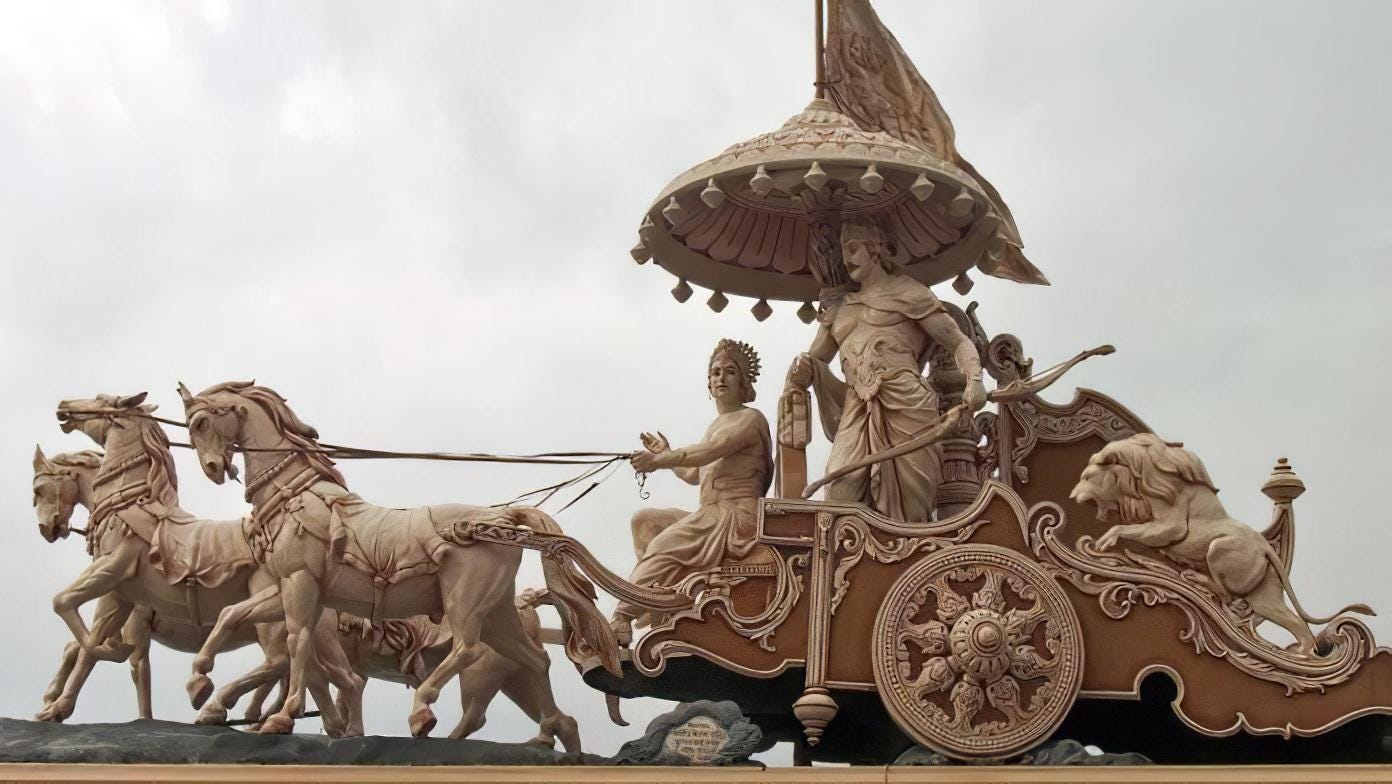The perfect opportunity (Bg 1.46)
Arjuna cast aside his bow and arrows and sat on the chariot. His mind was overwhelmed and he was unsure of what to do next. His lamentation, however, will be short-lived. Krsna is there.
« The Song of God: An in-depth study of the Bhagavad-gītā (Volume 1)
Verse 46: sañjaya uvāca
evam uktvārjunaḥ sankhye, rathopastha upāviśat
visṛjya sa-śaram cāpam, śoka-samvigna-mānasaḥ
Sañjaya said: Arjuna, having thus spoken on the battlefield, cast aside his bow and arrows and sat down on the chariot, his mind overwhelmed with grief.
By the end of the first chapter, Arjuna is completely distressed. He concludes that it would be better to be killed by the enemy without showing resistance than to fight them. Prabhupada comments "All these symptoms are due to soft-heartedness resulting from his being a great devotee of the Lord."
Arjuna was a great devotee and his hesitancy in fighting was founded in his soft-heartedness. Had he been a ruthless person, he would have not hesitated in fighting and recovering the kingdom that belonged to him and his brothers. This detachment and magnanimity, combined with his devotion and faith in Krsna's instructions put him in the perfect position to receive transcendental knowledge.
One obstacle in acting in Krsna consciousness is the attachment to the results. That's the platform most of us are. We act because we anticipate some enjoyable material result, and when such anticipation is not there, we don't have the will to work at all. Arjuna is already above this platform. He doesn't desire any material result from the battle. In fact, he is prepared to renounce his claim to the kingdom and retire to the forest to live a life of austerity.
Arjuna cast aside his bow and arrows and sat down on the chariot. This is also significant because previously, Arjuna had made a vow to kill anyone who would even suggest he would put down his bow. He was holding it the whole time, even while sleeping. His bow was more dear to him than his life. The fact that now Arjuna forgot about this and put his bow aside tells a lot about how distressed he was.
His mind was overwhelmed with grief and he was unsure of what to do next. This is, however, going to be short-lived. His soft-heartedness and his other qualifications attracted the mercy of the Lord, and by His instructions, Krsna would destroy his doubts very soon.
All of this happened in the middle of both armies, so everyone could see that Arjuna, the great hero, was pondering if he would fight or not. The soldiers on the side of the Kauravas were certainly feeling a great relief with the perspective of not having to face such a powerful foe, while the soldiers on the side of the Pandavas were surely apprehensive about the possibility of losing his most capable commander.
Thus, the Bhagavad-gītā starts in the most crucial moment, when everyone is paying complete attention, anxious to see what is going to happen next. What would be a better opportunity to speak about self-realization?
Main points in the purport of Srila Prabhupada:
"Sañjaya said: Arjuna, having thus spoken on the battlefield, cast aside his bow and arrows and sat down on the chariot, his mind overwhelmed with grief."
a) Arjuna sat on the chariot putting aside his bow and arrows. His soft heart and devotion made him fit to receive the mercy of the Lord.
« The Song of God: An in-depth study of the Bhagavad-gītā (Volume 1)


